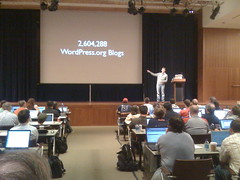Quite a day today. This afternoon, I went to the press check for the CLCV Scorecard at Alonzo Printing in Hayward. That’s always fun (no, really). I got to go on the tour for about the fourth time (because I was there with my new boss; it was her first time there). I think Alonzo does great work, I like the people there, and it’s now the #1 environmental printing company in the country or something like that.
As an aside, the two things I describe here are better documented on Flickr. I use it [or did at the time — JG, 1/21/2023] as a complement to what I’m doing here.
Anyway, after work, I finally let Amy — who is my semi-erstwhile trivia teammate and a former Pub Night denizen — drag me along to this thing called “Dorkbot SF“. This group of total rejects (or Übermenschen — who can figure it out?) gathers together, in their words, in “a monthly meeting of artists (sound/image/movement/whatever), designers, engineers, students and other interested parties… who are involved in the creation of electronic art (in the broadest sense of the term).”
It is definitely a broadly inclusive thing — the folks presenting tonight showed off: a faux-touchscreen/Wii-controller-hacked visual solution to the problem of not being able to mouse fast enough to DJ; artwork created on a “laser cutter,” which, you know, cuts or etches many types of materials using a laser, based on raster or vector artwork (but don’t put anything in there that will give off toxic fumes); and plans, or maybe just pipe dreams, for truly kick-starting space tourism.
I enjoyed it, of course, and will certainly go again. One of the things that appeals to me about Dorkbot, despite its silly name, is that it exists at the crossroads of art, science, technology, and long-term thinking. One of my other recent local discoveries, The Long Now Foundation, is somewhere in the same neighborhood, but Long Now could be Dorkbot’s more serious uncle.
Seeing the passions that people pursue — what they throw themselves into — really inspires me. It makes me think about how I could express what I want to express in different media. (It also makes me realize I don’t pay enough attention to what it is I actually want to express, or express it enough.) Music really resonates with me at a special level.
It seems to me that to this point I really haven’t decided exactly which way I’m going to go yet. I definitely continue to put my effort into things I consider at least somewhat worthwhile. I’m certainly going to avoid doing things that I don’t enjoy OR I don’t think are doing anything to improve society. Ideally, I will continue to iterate myself to a point at which I love what I do all the time, because it’s my own unique contribution to making this world better in some way. Ambitious? Yes.
Perhaps the important part of what I’ve been doing to this point in my life is the documentation and synthesis of all these different kinds of ideas and experiences and situations I’ve encountered. At the risk of sounding simultaneously pompous and hopelessly trivial (a particular talent of mine, I think), I’d like to be something like a really great bottle of Scotch. All these crazy things thrown into a wine barrel for many years, waiting, deepening, growing… and then all of a sudden you pour it out and it’s a masterpiece like nothing else you’ve ever tasted.
In the short term, at minimum, I’m at CLCV. And 2009 is going to be my most productive year there yet. The changes that have taken place since May — Susan leaving and Jenesse and Warner being hired — make me certain of that. CLCV’s incoming CEO (starting January 2nd, 2009), Warner Chabot, is already hitting the ground running. He has indicated quite clearly that he plans to give some desperately needed executive-level attention to CLCV’s brand and communications efforts, both online and off — as well as some actual investment. (By the end of 2009 we might actually have launched a new back end for our website that allows us to actually interact with our members online.)
To which I say “Thank you,” and “Finally.” I have said a couple times to anyone that will listen (and probably people that don’t) that, when Jenesse and then Warner got hired, it was as if I got a new job without going anywhere. Except some of the good things stuck around, like the good working relationships I’ve built with the vast majority of my co-workers, and my knowledge of the organization, and my nice 11th-floor office, and my five weeks of vacation.
(It occurs to me that the changes at work echo the larger context of emerging from the long national nightmare that was Dubya’s so-called presidency….)





